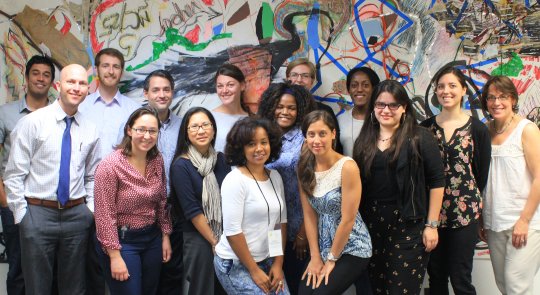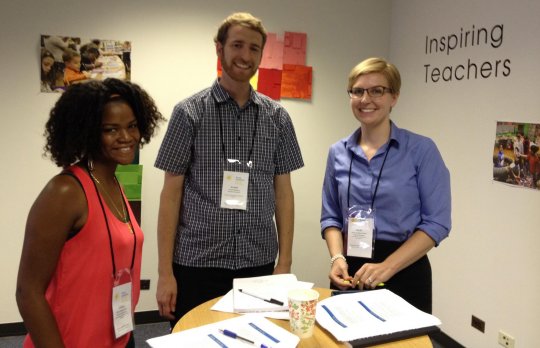What does the future of Young Audiences look like? The answer depends on those who lead the organization today - and those who will lead someday soon.

The emphasis on identifying and nurturing the next generation of leaders is best illustrated by the Young Audiences Emerging Leadership Institute funded through a grant from the American Express Foundation. The impact ELI is making is best described by one of its current participants. “We’ve only had one meeting so far, and I’m already inspired by talking to peers in my cohort, learning about their work, getting a lot of new ideas, and hearing how they approach the issues in their organizations,” says Joseph Spilberg, research program manager at Chicago Arts Partnerships in Education (CAPE), the Chicago affiliate of Young Audiences.
After three years on staff at CAPE, Joseph feels he’s mastered some things and now wants to dig deeper. He’s ready to learn how to take more of a leadership role on initiatives – and even to initiate efforts of his own.
This past summer, he joined 13 other highly motivated individuals from Young Audience affiliates in what will be an intensive, yearlong professional development journey. Through their participation in the ELI, they will strengthen their management skills and competencies, share best practices, collaborate with peers, and gain new perspectives.
In this way, Young Audiences hopes to create transformational leaders in the arts in education field.
Joseph could certainly become one of those transformational leaders considering his proven ability to continually transform himself. He holds a bachelor’s degree in French and a master’s in nonprofit management. Before joining CAPE, he worked as an arts administrator, music teacher and a professional musican – all at the same time. He plays many musical instruments, co-founded Intercultural Music Production, and was himself a teaching artist in the CAPE Supporting Communities through Arts Learning Environments, or SCALE, program.
These days, Joseph manages qualitative and quantitative research and evaluation of CAPE programs, working with staff on program design and implementation, fundraising efforts, organizational learning, and marketing.
“We use surveys, interviews and observations, along with big data – demographics, test scores, classroom grades – to get into the mechanics of our programs and the impact of this type of learning on students,” he says.

For Joseph, the invitation to participate in ELI was “perfect timing professionally.” The first session, Emerging Leadership Intensive Seminar, laid the foundational understanding of strategic management and leadership development across multiple disciples. He says the session, led by Lori Roth, founder of Strategic Learning Associates, in collaboration with CAPE Executive Director Amy Rasmussen, “felt like what you might study if you went for an MBA at a business school.”
Participants will meet again in November at the Young Audiences Leadership Conference and, in April, at YA’s Annual National Conference in Kansas City. Peer learning teams will work on projects at these sessions, which will be supplement by facilitated webinars throughout the year.
According to Joseph, half the value of the program is the content and half is meeting peers from other affiliates. “The best aspect of the program is the independent project, which gives us a chance to apply the content and lessons learned from others in a new initiative. I had already been thinking of ideas for the coming school year, so I’m leveraging my experience at the Emerging Leadership Institute to flesh out initiatives I had on the “back burner.”
He also sees value in having time devoted to thinking instead of reacting. “Being in middle management, my desk is always piled high with papers, and I’m constantly involved with making things happen. At the Institute, time is specifically carved out to stop doing stuff, to take a step back and analyze what is or isn’t working, and to contemplate ways to elevate our thinking around our work,” he says.
“This can be a pivot point for a lot of us in our careers, to take time to reflect on what we’ve done so far, and to look forward to what we can contribute to our organizations.”
This is an excerpt from the Young Audiences Inc. Annual Report 2014 - Text by Amy Binder - Click here to view the full 2014 annual report

